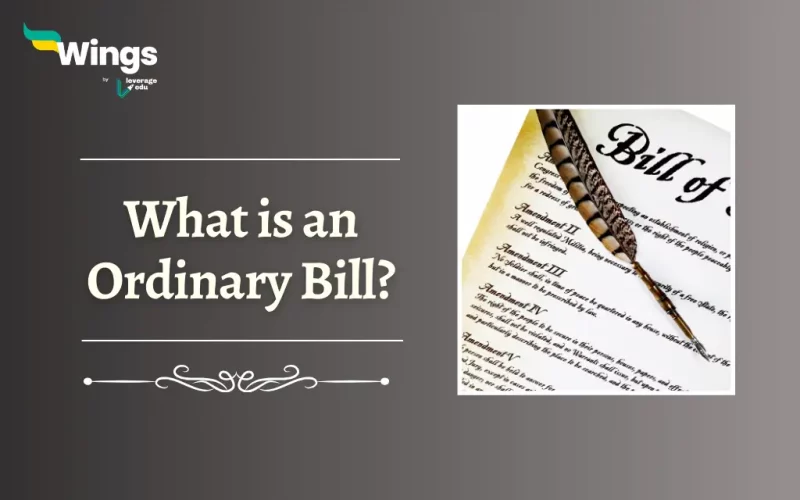An Ordinary Bill is a suggested law in India that deals with matters other than financial subjects like taxation, public spending, or borrowing money. The Ordinary Bill is in Article 107 and Article 108 of the Indian Constitution. Furthermore, these bills have a range of topics, such as creating new government agencies, revising existing laws (except those related to finance), environmental regulations, or social welfare programs. Unlike money bills, the introduction of Ordinary Bills can be in either House of the Parliament, the Lok Sabha or the Rajya Sabha. This blog also includes the Stages of how an Ordinary Bill is Passed in the Parliament and the latest Examples of the Bill.
How Ordinary Bill is Passed in Parliament?
Every Ordinary Bill has to pass through the following 5 Stages in the Parliament before it becomes a law. Here is how an Ordinary Bill is passed in the Parliament:
- First Reading: The process begins with the introduction of the bill, along with its publication in the Gazette. A minister or member presents the bill’s title and provides a brief overview in either House. At this stage, no debate takes place.
- Second Reading: During this phase, the bill undergoes thorough examination and takes its final form. Thus, making it an important stage in the process of enacting the bill.
- Stages of General Discussion: Printed copies of the bill are given to all members. Then they discuss its principles and provisions generally, without delving into the specifics.
- Committee Stage: Typically, bills are sent to a select committee of the House for review. The committee thoroughly examines the bill, delving into its details. It has the authority to make amendments, ensuring they align with the original principles of the bill.
- Consideration Stage: After the Select Committee submits the bill, the House reviews and votes on each clause separately. Members are also allowed to propose amendments during this stage.
- Third Reading: At this point, the discussion centers on whether to approve or dismiss the entire bill without any changes. If the majority of those present and voting agree to the bill, it is passed. Thereafter, forwarded to the second House by the presiding officer.
- Bill in the Second House: In the second House too, the bill goes through the above three stages. If the House passes the bill, it is sent to the President for their assent. Whereas if the bill gets rejected by the second House, or the first House rejects the second House’s amendments or the second House takes no action, there is a Deadlock.
- The resolution of the deadlock is the President summoning a joint sitting of both the Houses.
- If the majority during the joint sitting that is present and voting approves the bill, it is passed by both the Houses.
- Assent of the President: After the bill passes both the Houses it goes to the President for their assent.
Also Read: What is Adjournment Motion?
What is an Example of an Ordinary Bill?
Here are two examples of an Ordinary Bill:
- The Data Protection Bill of 2021: This bill aims to regulate the collection, storage, and use of personal data by companies operating in India. It focuses on protecting individual privacy and would not directly affect government finances, making it an ordinary bill.
- The Electoral Laws (Amendment) Bill of 2022: This amendment introduces changes to election laws, like linking voter ID with Aadhaar cards. Since it deals with electoral processes and not financial matters, it would likely be categorised as an ordinary bill if introduced.
Related Blogs
Lastly, we hope you liked our blog and gained an understanding of What is an Ordinary Bill. Moreover, you may even read more blogs and empower yourself with knowledge regarding Civics and Polity!
 One app for all your study abroad needs
One app for all your study abroad needs













